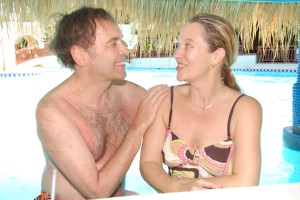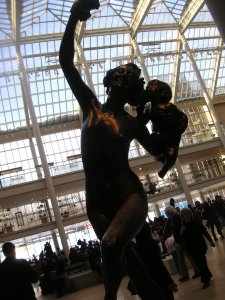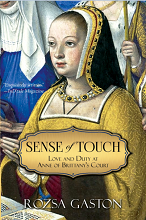 A long marriage teaches you the same thing. After awhile, gazing into each other’s eyes can get old, but if you both happen to enjoy gazing together in the same direction — you’ve got what it takes to stay the course. Prince William and his bride Kate certainly looked as if they do judging by their natural, relaxed and companionable body language at their wedding (and those two kisses on balcony). May they enjoy a long and happy union.
A long marriage teaches you the same thing. After awhile, gazing into each other’s eyes can get old, but if you both happen to enjoy gazing together in the same direction — you’ve got what it takes to stay the course. Prince William and his bride Kate certainly looked as if they do judging by their natural, relaxed and companionable body language at their wedding (and those two kisses on balcony). May they enjoy a long and happy union.
If you find you’ve stopped gazing into each others’ eyes, as many of us do anytime after the first year or two of a long-term relationship, you might try booking yourselves into a resort with a swim-up bar. There you can sip tropical drinks while ostensibly exercising and have your photo taken by a roaming resort photographer who will pose you to gaze into each others’ eyes even if it hadn’t occurred to you already.
What glass of wine would you sip while contemplating this quote?
I don’t know about the quote, but while contemplating this photo taken in Negril, Jamaica in 2009, I would certainly consider a tropical drink with a skewer of pineapple slices and cherries and at least one parasol stirrer. A Mai Tai perhaps? Your suggestions please.
Rozsa’s Weekly Excerpt
from Dogsitters (2010) by Rozsa Gaston
“I’ve got an idea.” She cocked her head. “We could stop off at the butcher’s on our way back to my place. I’ll pick up some steaks and grill them in my patio out back.”
“Great idea. The smell might attract Percy. We’re sweaty too after being out all day, so maybe he’ll pick up our scent,” Jack agreed.
They dropped by Ollie’s, Bronxville’s only butcher shop.
“Stay in the car,” she told him. “I’ve got this one. Just come up with an idea for finding our boy.”
Jack laughed, his eyes crinkling at each corner. It was a pleasant sound.
Why did she feel light as air, considering the circumstances? They would attract the dog back to them somehow. She felt sure of it as she stood in front of the counter, watching the butcher weigh two thick steaks.
One hour later, with the sun low on the horizon, she had fired up the grill in her small backyard. Jack had just returned from one final walk around the neighborhood. Apparently he’d made a stop on the way back. After closing and latching the gate to Hint’s backyard, he pulled out a bottle of Pinot Noir from the paper bag under his arm. Smart man.
“I’ll feel guilty having too good a time with Percy missing,” she said hesitantly, belying her rapidly rising spirits. Her dog hunting partner had manners, if not subtlety.
“Okay, so let’s just have a moderately good time,” he mollified her. “Don’t forget the power of in vino veritas.”
“Why should I share my veritas with you?” she teased, liking the look of his broad shoulders encased in a red polo shirt faded almost pink.
“I want you to have a revelation this evening,” he said.
“A revelation?” She was startled.
“You’re going to get an intuition about Percy. I can feel it.”
“You can?” Was he teasing or did he really believe in the kind of stuff she did?
“My intuition tells me yours is going to come up with something.” He smiled. “About the dog,” he added.
Of course she had intuition. She just wasn’t comfortable revealing that side of herself to someone she’d just met. But didn’t she need to put herself on the line in order to find Percy? One thing was certain – they’d never find the dog using Jack’s crude techniques. She ran upstairs to get salad and wineglasses.
The steaks sizzled as Jack opened the bottle of wine. He poured two glasses then held one out to her.
“Here’s to finding Percy.” She lightly clinked glasses with him and looked up at the sky. “We need Your help up there.”
Jack’s eyes followed hers upward. “Help us to help each other find him,” he added.
Love does not consist in gazing at each other but in looking outward together in the same direction flashed through her mind. They were the words of the author of one of her most beloved childhood books, The Little Prince. Something inside shifted.
His cellphone rang. She turned back to the steaks, but not before she saw his face darken as he took in the voice on the other end.
from Dogsitters (2010) by Rozsa Gaston











